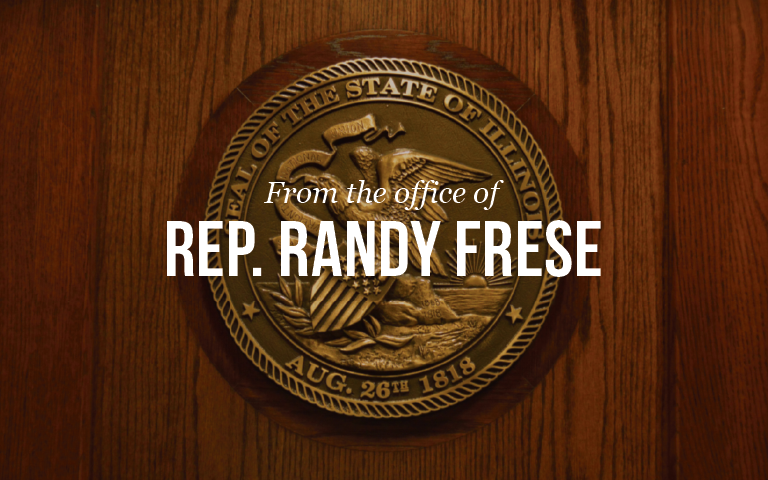First week of Veto Session left many issues unaddressed

After the first week of veto session in the Illinois House concluded last week, there are still a number of priorities that House Republicans are looking ahead to solve in the coming weeks. One of those is addressing Senate Bill 76, which was vetoed by the Governor this summer. The bill would lift the 36-year ban on new nuclear energy construction permits.
Since 1987, Illinois has prohibited new nuclear construction. However, Illinois remains a nuclear power with 11 current operating reactors, the most of any state. Illinois is in the top three states with 54 percent of its energy generation being nuclear, while also having the most generating capacity (11.6 gigawatts) of any state.
My Republican colleagues and I are also demanding action on the Invest in Kids program, the State-backed scholarship program that incentivizes private doners to give money to scholarship funds that help students attend private schools across Illinois. The Invest in Kids program will sunset on December 31 of this year if it is not extended by the General Assembly. Invest in Kids has helped thousands of Illinois students attend schools where they are challenged and encouraged to reach their maximum potential. House Republicans have introduced legislation which would eliminate the program’s sunset clause.
House Democrats approve bill that could lead to unionization of legislative staff
The Illinois House and Senate have legislative staff members that are supervised by the four legislative leaders, by the Clerk of the House, and by the executive directors of certain nonpartisan committees and bureaus who answer to the four legislative leaders. Up until now, these staff members have worked outside the confines of the laws and structures that govern organized labor.
The Legislative Employee Labor Relations Act, if it is approved by the Senate and signed by Gov. Pritzker, would take steps to bring Illinois legislative staff under these laws and structures. These employees could sign union cards, choose representatives for collective bargaining, pay union dues, and potentially go out on strike. Workers covered by this Act could include district office staff hired by legislators. HB 4148 was approved by the House last week. Most House Republicans voted against it for several reasons, the most important being that it could create serious problems with General Assembly operations during legislative sessions.
Many questions about this proposal remain unanswered.
Gov. Pritzker splits up troubled DCFS
The Department of Children and Family Services (DCFS) has come under severe criticism from child welfare advocates, from the press, and from courts that have taken cases of individual child rights under advisement. Resigning DCFS Director Marc Smith has faced numerous contempt of court citations, based on cases involving individual children resident in Illinois, for contempt of court.
Although DCFS currently has a record-high taxpayer-funded employee headcount of 3,148 employees, reports of agency inaction in the face of child abuse and neglect continue to flood into the headlines and the district offices of the Illinois General Assembly. House Republican members have spoken out against DCFS inaction in the face of child abuse, neglect, and deaths.
Governor Pritzker’s proposal and executive order will create a new State agency to inspect and regulate child care service environments, preschools, and early intervention programs. Pritzker’s office has already set up the “Governor’s Office of Early Childhood Development.” This Office’s areas of responsibility will now be elevated into a new Early Childhood Program Agency.
The General Assembly has the power to review the executive order creating the new Agency and, if the creation is contrary to overall State policy, the General Assembly can strike it down. The General Assembly will also be asked to appropriate taxpayer funds for the new agency.
2023 harvest moves toward close

The “Illinois Crop Progress” report from the U.S. Department of Agriculture shows rapid progress at finishing up the 2023 harvests of corn and soybeans. Relatively dry weather has enabled heavy machinery to keep moving in the fields. For the week ended Sunday, October 22, 70% of Illinois corn was harvested (up from 52% one week earlier) and 80% of the beans were harvested (up from 61% one week earlier).
Dry conditions continue to affect Illinois fields, including pastures and winter wheatfields where growth will continue until freezing temperatures hit. Operators of pastureland reported not-so-good grass conditions to the USDOA, with 45% of Illinois pastureland reported to be in “very poor” (21%) or “poor” (24%) condition. Recent precipitation has been below-normal in every sector of Illinois, with particularly challenging dry conditions in sectors of southern Illinois.
Illinois offers guidance to families in preparation for trick-or-treating

Families can do many things to increase the safety of their loved ones during Halloween trick-or-treating activities.
Fires, traffic accidents, and allergic reactions are common Halloween hazards. Costumes should be marked “flame resistant” when sold or made of materials so marked. With twilight the most popular time for trick-or-treating, costumes should be bright and reflective; if not, the one who prepares the costume can stick on strips of reflective tape. Any makeup should be pre-tested a couple days earlier to check for possible allergic reactions to any substance within the makeup.
Many parents will want to inspect and sort the candies and other treats that their trick-or-treaters bring home. Commercially wrapped candies are not necessarily safe; candies can be unwrapped and re-wrapped. Any child food allergies known to the parents will be a potential issue. And some treats, in the hands of small children, are choking hazards.
I hope everyone has a fun and safe Halloween!
